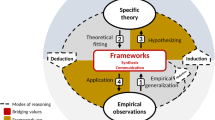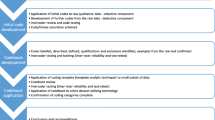Abstract
This article shows the intersections of participatory research, popular education, empowerment planning, and community organizing with participatory evaluation. It argues that a truly successful participatory evaluation involves participants in guiding and even conducting the research, doing a process of self- and program study, creating plans for change, and organizing themselves for implementing these plans. Next, the chapter shows how these elements played out in a participatory evaluation of a community organizing training and technical assistance project in Toledo, Ohio. The first year of the project was facilitated by participatory evaluation that helped identify early successes and problems so participants could make programmatic changes early in the process. The telling of the story also develops practices of participatory evaluation, including planning the evaluation, doing the research and adapting it to changing conditions, uncovering creative tensions, participatory validity checking, and linking the process to planning and action. The chapter concludes with some lessons for participatory evaluation practice.
Similar content being viewed by others
REFERENCES
Alinsky, Saul. 1969 [1946]. Reveille for Radicals. New York: Vintage.
Alinsky, Saul. 1971. Rules for Radicals. New York: Vintage.
Andrews, Arlene Bowers. 1996. “Realizing Participant Empowerment in the Evaluation of Nonprofit Women's Services Organizations: Notes from the Front Line.” Pp. 141–158 in David M. Fetterman, Shakeh J. Kaftarian, and Abraham Wandersman (Eds.), Empowerment Evaluation: Knowledge and Tools for Self-Assessment and Accountability. Thousand Oaks, CA: Sage.
Association of Community Organizations for Reform Now (ACORN). (1998). http://www.igc.apc.org/community/.
Beckwith, Dave (with Cristina Lopez) 1997. “Community Organizing: People Power from the Grassroots.” COMM-ORG: The On-Line Conference on Community Organizing and Development, http://comm-org.utoledo.edu/papers97/beckwith.htm.
Benson, Kenneth. 1977. “Organizations, a Dialectical View.” Administrative Science Quarterly 22:1–21.
Benson, Kenneth. 1983. “A Dialectical Method for the Study of Organizations.” In Gareth Morgan (Ed.), Beyond Method: Strategies for Social Research. Beverly Hills, CA: Sage.
Brown, L. David, and Rajesh Tandon. 1983. “Ideology and Political Economy in Inquiry: Action Research and Participatory Research.” Journal of Applied Behavioral Science 19:277–294.
Butterfoss, Frances Dunn, Robert M. Goodman, Abraham Wandersman, Robert F. Valois, and Matthew J. Chinman. 1996. “The Plan Quality Index: An Empowerment Evaluation Tool for Measuring and Improving the Quality of Plans.” Pp. 304–331 in David M. Fetterman, Shakeh J. Kaftarian, and Abraham Wandersman (Eds.), Empowerment Evaluation: Knowledge and Tools for Self-Assessment and Accountability. Thousand Oaks, CA: Sage.
Cassidy, Robert. 1980. Livable Cities: A Grass-Roots Guide to Rebuilding Urban America. New York: Holt, Rinehart & Winston.
Dean, G. J., and W. D. Dowling. 1987. “Community Development: An Adult Education Model.” Adult Education Quarterly 37:78–89.
Dugan, Margret A. 1996. “Participatory and Empowerment Evaluation: Lessons Learned in Training and Technical Assistance.” Pp. 277–303 in David M. Fetterman, Shakeh J. Kaftarian, and Abraham Wandersman (Eds.), Empowerment Evaluation: Knowledge and Tools for Self-Assessment and Accountability. Thousand Oaks, CA: Sage.
East St. Louis Action Research Project (ESLARP). 1996. http://imlab9.landarch.uiuc.edu/~eslarp.
Estrella, Marisol, and John Gaventa. 1997. “Who Counts Reality? Participatory Monitoring and Evaluation: A Literature Review.” Presented at the International Workshop on Participatory Monitoring and Evaluation: Experience and Lessons. Cavite, Philippines.
Fals-Borda, Orlando. 1991. “Some Basic Ingredients.” Pp. 3–12 in Orlando Fals-Borda and Mohammad Anisur Rahman (Eds.), Action and Knowledge: Breaking the Monopoly with Participatory Action-Research. New York: Apex.
Fetterman, David M. 1994a. “Empowerment Evaluation.” Evaluation Practice 15:1–15.
Fetterman, David M. 1994b. “Steps of Empowerment Evaluation: From California to Capetown.” Evaluation and Program Planning 17:305–313.
Fetterman, David M. 1996a. “Empowerment Evaluation: An Introduction to Theory and Practice.” Pp. 3–46 in David M. Fetterman, Shakeh J. Kaftarian, and Abraham Wandersman (Eds.), Empowerment Evaluation: Knowledge and Tools for Self-Assessment and Accountability. Thousand Oaks, CA: Sage.
Fetterman, David M. 1996b. “Conclusion: Reflections on Emergent Themes and Next Steps.” Pp. 379–384 in David M. Fetterman, Shakeh J. Kaftarian, and Abraham Wandersman (Eds.), Empowerment Evaluation Knowledge and Tools for Self-Assessment and Accountability. Thousand Oaks, CA: Sage.
Fetterman, David M. 1997. “Collaborative, Participatory, and Empowerment Evaluation”. http://www-leland.stanford.edu/~davidf/empowermentevaluation.html.
Fetterman, David M., Shakeh J. Kaftarian, and Abraham Wandersman (Eds.). 1996. Empowerment Evaluation: Knowledge and Tools for Self-Assessment and Accountability. Thousand Oaks, CA: Sage.
Freire, Paulo. 1982. “Creating Alternative Research Methods: Learning to Do It by Doing It.” Pp. 29–37 in Budd Hall, A. Gillette, and R. Tandon (Eds.), Creating Knowledge: A Monopoly? Participatory Research in Development (series 1). New Delhi: Participatory Research Network.
Friedman, Elizabeth. 1978. “Crest Street: A Family/Community Impact Statement.” Policy Paper No. 2 of the Center for the Study of the Family and the State. Institute of Policy Sciences and Public Affairs, Duke University, Durham, NC.
Gaventa, John. 1991. “Toward a Knowledge Democracy: Viewpoints on Participatory Research in North America.” Pp. 121–133 in Orlando Fals-Borda and Mohammad Anisur Rahman (Eds.), Action and Knowledge: Breaking the Monopoly with Participatory Action-Research. New York: Apex.
Gaventa, John. 1993. “The Powerful, the Powerless, and the Experts: Knowledge Struggles in an Information Age.” Pp. 21–40 in Peter Park, Mary Brydon-Miller, Budd Hall, and Ted Jackson (Eds.), Voices of Change: Participatory Research in the United States and Canada. Westport, CT: Bergin & Garvey.
Grills, Cheryl N., Karen Bass, Didra L. Brown, and Aletha Akers. 1996. “Empowerment Evaluation: Building upon a Tradition of Activism in African American Community.” Pp. 123–140 in David M. Fetterman, Shakeh J. Kaftarian, and Abraham Wandersman (Eds.), Empowerment Evaluation: Knowledge and Tools for Self-Assessment and Accountability. Thousand Oaks, CA: Sage.
Hall, Budd. 1993. “Introduction.” Pp. Xiii–xxii in Peter Park, Mary Brydon-Miller, Budd Hall, and Ted Jackson (Eds.), Voices of Change: Participatory Research in the United States and Canada. Westport, CT: Bergin & Garvey.
Hamilton, Edwin. 1992. Adult Education for Community Development. New York: Greenwood.
Hasell, Mary Joyce. 1987. “Community Design and Gaming/Simulation: Comparison of Communication Techniques in Participatory Design Sessions.” Simulation & Games 18:82–115.
Heron, John. 1996. Co-operative Inquiry: Research into the Human Condition. Thousand Oaks, CA: Sage.
Horton, Myles, and Paulo Freire. 1990. We Make the Road by Walking: Conversations on Education and Social Change (B. Bell, J. Gaventa, and J. Peters, Eds.). Philadelphia: Temple University Press.
Jones, Bernie. 1990. Neighborhood Planning: A Guide for Citizens and Planners. Chicago: Planners Press, American Planning Association.
Kennedy, Marie. 1996. “Transformative Community Planning: Empowerment Through Community Development.” Prepared for the 1996 Planners Network Conference. Available at http://www.plannersnetwork.org/combased.htm.
Lynd, Mark. 1992. “Creating Knowledge through Theater: A Cast Study with Developmentally Disabled Adults.” The American Sociologist 23:100–115.
Marsden, David, and Peter Oakley. 1991. “Future Issues and Perspectives in the Evaluation of Social Development.” Community Development Journal 26:287–328.
Millett, Ricardo A. 1996. “Empowerment Evaluation and the W. K. Kellogg Foundation.” Pp. 65–76 in David M. Fetterman, Shakeh J. Kaftarian, and Abraham Wandersman (Eds.), Empowerment Evaluation: Knowledge and Tools for Self-Assessment and Accountability. Thousand Oaks, CA: Sage.
Morris, Aldon. 1984. The Origins of the Civil Rights Movement: Black Communities Organizing for Change. New York: Free Press.
Nyden, Philip, Anne Figert, Mark Shibley, and Darryl Burrows (Eds.). 1997. Building Community: Social Science in Action. Thousand Oaks, CA: Pine Forge Press.
Nyden, Philip, and Wim Wiewal. 1992. “Collaborative Research: Harnessing the Tensions between Researcher and Practitioner.” The American Sociologist 23:43–55.
Park, Peter. 1993. “What Is Participatory Research? A Theoretical and Methodological Perspective.” Pp. 1–20 in Peter Park, Mary Brydon-Miller, Budd Hall, and Ted Jackson (Eds.), Voices of Change: Participatory Research in the United States and Canada. Westport, CT: Bergin & Garvey.
Park, Peter, and Lee Williams. 1999. “From the Guest Editors: A Theoretical Framework for Participatory Evaluation Research.” Sociological Practice: A Journal of Clinical and Applied Research. Forthcoming.
Patton, Michael Quinn. 1997a. Utilization-Focused Evaluation: The New Century Text (3rd ed.). Thousand Oaks, CA: Sage.
Patton, Michael Quinn. 1997b. 'Toward Distinguishing Empowerment Evaluation and Placing It in a Larger Context.” Evaluation Practice 18(2):147–163.
Pyatok, Michael, and Hanno Weber. 1978. “Participation in Residential Design: A Method for Generating Choice and Its Ideological Consequences.” Pp. 173–204 in Henry Sanoff (Ed.), Designing with Community Participation. Stroudsburg, PA: Dowden, Hutchinson & Ross.
Reardon, Kenneth M. (n.d.). Community Development in Low-Income Minority Neighborhoods: A Case for Empowerment Planning. Unpublished manuscript. University of Illinois, Urbana-Champaign.
Stevenson, John F., Roger E. Mitchell, and Paul Florin. 1996. “Evaluation and Self-Direction in Community Prevention Coalitions.” Pp. 208–233 in David M. Fetterman, Shakeh J. Kaftarian, and Abraham Wandersman (Eds.), Empowerment Evaluation: Knowledge and Tools for Self-Assessment and Accountability. Thousand Oaks, CA: Sage.
Stoecker, Randy. 1991. “Evaluating and Rethinking the Case Study.” Sociological Review 39:88–112.
Stoecker, Randy. 1998. “Are Academics Irrelevant: Roles for Scholars in Participatory Research.” COMM-ORG: the On-Line Conference on Community Organizing and Development. http://comm-org.utoledo.edu/papers.htm.
Stoecker, Randy, and Edna Bonacich. 1992. “Why Participatory Research?” The American Sociologist 23:5–14.
Stoecker, Randy, and Susan Stall. 1996. “Community Organizing or Organizing Community? Gender and the Crafts of Empowerment.” COMM-ORG: the On-Line Conference on Community Organizing and Development. http://comm-org.utoledo.edu/papers.htm.
Stringer, Ernest T. 1996. Action Research: A Handbook for Practitioners. Thousand Oaks, CA: Sage.
Uphoff, Norman. 1991. “A Field Methodology for Participatory Self-Evaluation.” Community Development Journal 26:271–286.
Vargas, Laura. 1991. “Reflections on Methodology of Evaluation.” Community Development Journal 26:266–270.
Wadsworth, Yoland. 1984. Do It Yourself Social Research. Melbourne: Victorian Council of Social Service and the Melbourne Family Care Organisation.
Wadsworth, Yoland. 1991. Everyday Evaluation on the Run. Melbourne: Action Research Association.
Williams, Lee. 1996. “First Enliven, Then Enlighten: Popular Education and the Pursuit of Social Justice.” Sociological Imagination 33:94–116. Also available at http://comm-org.utoledo.edu/si/sihome.htm.
Author information
Authors and Affiliations
Rights and permissions
About this article
Cite this article
Stoecker, R. Making Connections: Community Organizing, Empowerment Planning, and Participatory Research in Participatory Evaluation. Sociological Practice 1, 209–231 (1999). https://doi.org/10.1023/A:1022874507194
Issue Date:
DOI: https://doi.org/10.1023/A:1022874507194




